

Introduction to Memetics: Symnoesis, Nouosis, and the Metanoetic. I was really tempted to call this article “Intro to Memes for Mind-Controlling Teens,” but we’ll have to save the mind control for the chapter about Memetic Engineering.
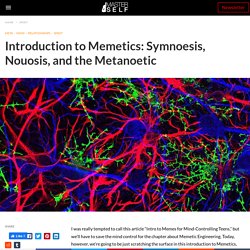
Today, however, we’re going to be just scratching the surface in this introduction to Memetics, the article I promised in Triple Meta. For those who are unfamiliar, a meme (pronounced meem, not me-me) is essentially a unit of idea. Richard Dawkins proposed the idea in his book “The Selfish Gene,” as an informational equivalent to a gene (hence the pronunciation). Now, I don’t much care for Dawkins, and I haven’t finished reading The Selfish Gene yet, so we’re going to leave him at the door.
Gardner's Theory of Multiple Intelligences. By Michele Marenus, published June 09, 2020 What is Multiple Intelligences Theory?
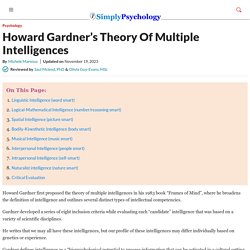
Howard Gardner's theory of multiple intelligences proposes that people are not born with all of the intelligence they will ever have.This theory challenged the traditional notion that there is one single type of intelligence, sometimes known as “g” for general intelligence, that only focuses on cognitive abilities.To broaden this notion of intelligence, Gardner introduced eight different types of intelligences consisting of: Linguistic, Logical/Mathematical, Spatial, Bodily-Kinesthetic, Musical, Interpersonal, Intrapersonal, and Naturalist.Gardner notes that the linguistic and logical-mathematical modalities are most typed valued in school and society.Gardner also suggests that there may other “candidate” intelligences—such as spiritual intelligence, existential intelligence, and moral intelligence—but does not believe these meet his original inclusion criteria.
(Gardner, 2011). Potential Career Choices. Chapter 7: Human Society. Chapter 7: HUMAN SOCIETY As a species, we are social beings who live out our lives in the company of other humans.
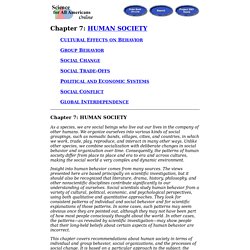
We organize ourselves into various kinds of social groupings, such as nomadic bands, villages, cities, and countries, in which we work, trade, play, reproduce, and interact in many other ways. Social Exchange Theory. How Hardwired Is Human Behavior? New fields of science don’t emerge in a flash, and evolutionary psychology—sometimes called modern Darwinism—is no exception.

But over the past several years, evolutionary psychology as a discipline has gathered both momentum and respect. A convergence of research and discoveries in genetics, neuropsychology, and paleobiology, among other sciences, evolutionary psychology holds that although human beings today inhabit a thoroughly modern world of space exploration and virtual realities, they do so with the ingrained mentality of Stone Age hunter-gatherers.
Homo sapiens emerged on the Savannah Plain some 200,000 years ago, yet according to evolutionary psychology, people today still seek those traits that made survival possible then: an instinct to fight furiously when threatened, for instance, and a drive to trade information and share secrets. (1) 24. Schizophrenia. Dean Radin Ph.D. on Consciousness, Parapsychology, and the Observer Effect. An Introduction to Paranormal Psychology - with Chris French.
Psychological Tricks: How To Spot a Liar. (1) Why Do Stupid People Think They're Intelligent? (2) Mastering Navigation - Art and Science of Psychology. The Wisdom of Psychopaths [Audiobook] by Kevin Dutton. NARCISSIST, SOCIOPATH, OR PSYCHOPATH?: HOW TO RECOGNIZE THE DISTINCTIONS. Energypsych. Is Asperger's syndrome the next stage of human evolution? - Australian Story.
Maslow’s Hierarchy of Needs: A Definitive Guide to Human Motivation. What motivates you? What drives you to get out of bed and do what you do each day? If you’re working on a big creative project, why are you doing it? If you exercise, what are the reasons you tell yourself? To stay fit? Schizophrenic Techniques: Cybernetics, the Human Sciences, and the Double Bind. Psychological Types. Psychological Types is Volume 6 in the Princeton / Bollingen edition of The Collected Works of C.
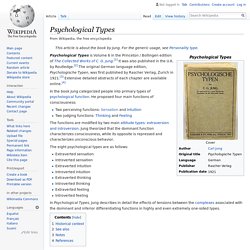
G. Jung.[1] It was also published in the U.K. by Routledge.[2] The original German language edition, Psychologische Typen, was first published by Rascher Verlag, Zurich in 1921.[3] Extensive detailed abstracts of each chapter are available online.[4] The eight psychological types are as follows: Extraverted sensationIntroverted sensationExtraverted intuitionIntroverted intuitionExtraverted thinkingIntroverted thinkingExtraverted feelingIntroverted feeling Historical context[edit] Participation - Jungian Genealogy, by Iona Miller. Archetypes and the Collective Unconscious. Ancestral Gnosis - Jungian Genealogy, by Iona Miller. How Little Things Can Make a Big Difference: Malcolm Gladwell on Sociological Changes (2000) About. The concept of the Archetype and it significance in spiritual alchemy.

The concept of the archetype is central to spirituality in general because it is the inherent, transpersonal nature of the archetypal components of the psyche that act as the motivator and guiding force in the Adept. The archetypes, therefore, can be seen as spiritual instincts. This metaphysical understanding is one which stretches back in the West at least as far as to the philosophical schools in Classical Athens. As has been comprehensively demonstrated throughout the book "The Idea of the Archetype", the Hebrew and Christian Bibles cannot be fully understood without a theological engagement with the concept. The concept is also a central ingredient in the transformation dynamics of spiritual alchemy. Despite (or perhaps because of) its ancient legacy the theory of the archetype has become shrouded in controversy and misinterpretation. 5 Sybmols and Transformations (Collected Works of C. G. Jung, Volume 5)
Von Franz Luise Marie Jung Gustav Carl Man and His Symbols 1988. Reading Jung: Symbols of Transformation – Self-realization. Carl Jung’s Volume 5 titled Symbols of Transformation (SoT) is one of Jung’s more difficult texts to read and understand.
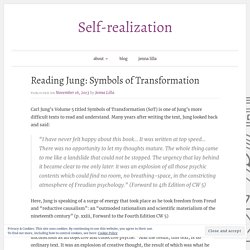
Many years after writing the text, Jung looked back and said: “I have never felt happy about this book… It was written at top speed… There was no opportunity to let my thoughts mature. Ancestral Gnosis - Jungian Genealogy, by Iona Miller. How to Use Carl Jung's Shadow Work Process for Rapid Personal Growth. We live in a world of duality.

Here and there. Hot and cold. Yin and yang. Light and dark. Psychoanalytical Interpretation of the Demoniacal Possession and the mystical Development of Sister Jeanne des Anges From Loudun (1605-1665): The International Journal for the Psychology of Religion: Vol 5, No 4. The Dunning–Kruger Effect: On Being Ignorant of One's Own Ignorance. JavaScript is disabled on your browser.
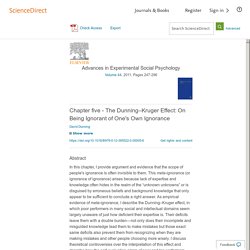
Please enable JavaScript to use all the features on this page. 1. Introduction to Human Behavioral Biology. Red Book by Jung Complete. Carl Jung Approaching the Unconscious. Overestimating Our Intelligence: Just How Smart Are Other Animals? Carl Jung's "Synchronicity" Explained.
Psychology's Magician. Algis Valiunas The great modern doctors of the mind have made men realize as never before the strangeness of their own psyches, and no psychologist has uncovered, or invented, stranger psychic marvels than did Carl Jung (1875-1961).

Although his name still lingers on in pop-psychology circles, the substance of Jung’s ideas and his analytical psychology techniques is fading from memory. Perhaps he is now most remembered as a favored disciple of Sigmund Freud who later became Freud’s most reviled apostate. The split between Freud and Jung presaged today’s division in how we think about the mind: we are fixated on the notion that our inner lives can be investigated through methods of rational inquiry like those so successfully applied to physics and chemistry, but we cannot shake the lurking feeling that our psyches are in reality beasts hidden in shadow — that they can never be fully brought out of the woods into the full light of day.
But was not the last magician. A Spiritual Searcher. Human behavioral ecology and its evil twin. Ruth Macea,b + Author Affiliations Address correspondence to R. Game of Thrones: How Power Really Works. Shrink Rap Radio Psychology Interviews: Exploring brain, body, mind, spirit, intuition, leadership, research, psychotherapy and more! » #391 – James Hillman’s Archetypal Psychology with Jungian Analyst Patricia Berry. CYBER-PSYCHOLOGY. Cyber-psychology/ Cyborg Psychology Below you will find the table of contents and summary of the book I am currently working on. Emotional literacy is an aspect of this larger picture. I should explain that I called this subject cyber-psychology long before the "cyber" affix was added to everything but the kitchen sink.
I am considering changing the title to Cyborg Psychology. No matter, if you want to download the whole book I can make it available to you via e-mail . I can also get you a spiral bound hard copy or a diskette of it; if you are interested you can order them. Psycho-cybernetics. September 2016 Psychology One of the main secrets to staying healthy and being successful consists of aligning one’s objectives and desires with the internal image of oneself. Many uncomfortable, everyday conditions are born out of the impossibility to change reality and they require a personal change, but which cannot be limited to how one behaves, rather it involves the internal vision of oneself.
Psycho-cybernetics is an approach which helps the mind and it was the result of Maxwell Maltz’s studies regarding concepts and psychological approaches, which are useful for dealing with identity problems, something he came across after operations he performed when he practised cosmetic surgery. Speaking of Jung – Podcast. Jeffrey T. Kiehl, Ph.D. is a Jungian analyst living in Santa Cruz, California. He holds a master's degree in physics from Indiana University and a doctorate in atmospheric science from the State University of New York in Albany.
In 2003, he went on to earn a master's in psychology before embarking on his analytical training with the Inter-Regional Society of Jungian Analysts. Dr. Kiehl is currently a senior scientist in the Climate Change Research Section of the National Center for Atmospheric Research in Boulder, Colorado. Depth Insights - Radio Podcasts with a Jungian and Depth Psychology orientation. On Soul, Character and Calling : A Conversation with James Hillman. 6 Powerful Psychological Effects That Explain How Our Brains Tick. Psychology Courses - Online Classes with Videos. The Amerikan Way – A Study in Psychopathy. 27th March 2016. Manly P. Hall - Cinderella Story in Psychological Folklore. Manly P. Hall - Psychic Self Destruction (Psychology and Self Improvement Series) The 12 Common Archetypes. The 12 Common Archetypes. Academy of Ideas » The Abyss of Time and Space and the Insignificance of Human Life.
The War on Conciousness - Michael Tsarion. Handwriting Analysis Lessons (Free) Notice: In these lessons you will learn everything about handwriting and how to interpret the various styles, slants, loops, sizes and spacing that reveals truths about our personality and character. It is a free, comprehensive tutorial that will provide you with all of the knowledge to make your own analysis of yourself, your friends or business clients. Handwriting Analysis- What is it? Handwriting analysis, or graphology, is the science involved in producing a personality profile of the writer by examining the characteristics, traits and strokes of an individual's handwriting. I know it seems impossible, but a trained graphologist can gather an astonishing amount of information about the writer just from analyzing their handwriting.
Besides creating a complete personality profile, many other things are revealed in your handwriting, such as health issues, morality, past experiences, hidden talents, mental problems-- to name just a few. How it works Your brain guides your hand. 1. How To Pass Psychometric Tests. Future - How dark is your personality?